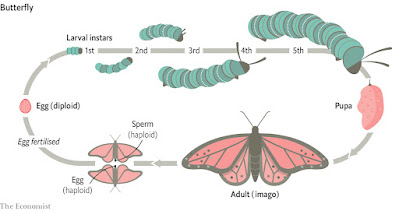This is your life: birth, sex, and death!

Symmetry breaking is integral to biology. Spatial symmetry is broken as cells differentiate and also as organs form. Time reversal symmetry is broken in the life history of the development of individuals: from birth to death, it is heading just one way. The fourth article in The Economist , Biology briefs, is Making your way in the world: An individual’s life story is a dance to the music of time . Here is the opening paragraph. The organs of a body are a spatial division of labour, one created by different genes being turned on in different cells. The same process serves to give individual lives a division of labour over time. Complex algae, animals, fungi and plants all have predictable life histories which separate out three basic aspects of development —the creation of an autonomous individual, growth and reproduction—and run them sequentially. There is also a fourth stage: death! Individual identity is tied up with sex. A lot of the complexity here is to do with sex... Sex is c
